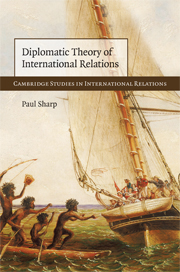Book contents
- Frontmatter
- Contents
- Acknowledgements
- Introduction
- Part I Traditions of international thought and the disappointments of diplomacy
- Part II Elements of a diplomatic tradition of international thought
- Part III Diplomatic understanding and international societies
- 6 Using the international society idea
- 7 Integration–disintegration
- 8 Expansion–contraction
- 9 Concentration–diffusion
- Part IV Thinking diplomatically about international issues
- Conclusion
- Bibliography
- Index
- Cambridge Studies in International Relations
9 - Concentration–diffusion
Published online by Cambridge University Press: 05 June 2012
- Frontmatter
- Contents
- Acknowledgements
- Introduction
- Part I Traditions of international thought and the disappointments of diplomacy
- Part II Elements of a diplomatic tradition of international thought
- Part III Diplomatic understanding and international societies
- 6 Using the international society idea
- 7 Integration–disintegration
- 8 Expansion–contraction
- 9 Concentration–diffusion
- Part IV Thinking diplomatically about international issues
- Conclusion
- Bibliography
- Index
- Cambridge Studies in International Relations
Summary
International societies can be thought of in terms of the way anything we think is valuable or interesting in them is distributed, and the extent to which this distribution is concentrated or diffuse. Thus, we can describe the world in terms of concentrations of things like natural resources, products and money, or in terms of people like bankers, soldiers, doctors and children. Our interest in the way people and things are distributed in societies is usually tied to an interest in how those societies are organized and operate and how both shape the lives of their members. To this end, we often try to lump them, or some of them, together calling them power, and ask how this is distributed. This is a notoriously difficult activity to undertake, but the magnitude of the difficulty seems matched only by the magnitude of our compulsion to keep trying and the arguments that break out as a consequence. We keep trying because we believe that an understanding of the distribution of power in any social setting will give us a better understanding of the way things are, what may be attempted, and what is likely to happen. Many of us also believe that such a better understanding will make us stronger, freer and more secure, and this is often, but not always, the case. Whether we are better or happier people because we are stronger, freer and more secure is, of course, another matter.
- Type
- Chapter
- Information
- Diplomatic Theory of International Relations , pp. 169 - 192Publisher: Cambridge University PressPrint publication year: 2009



